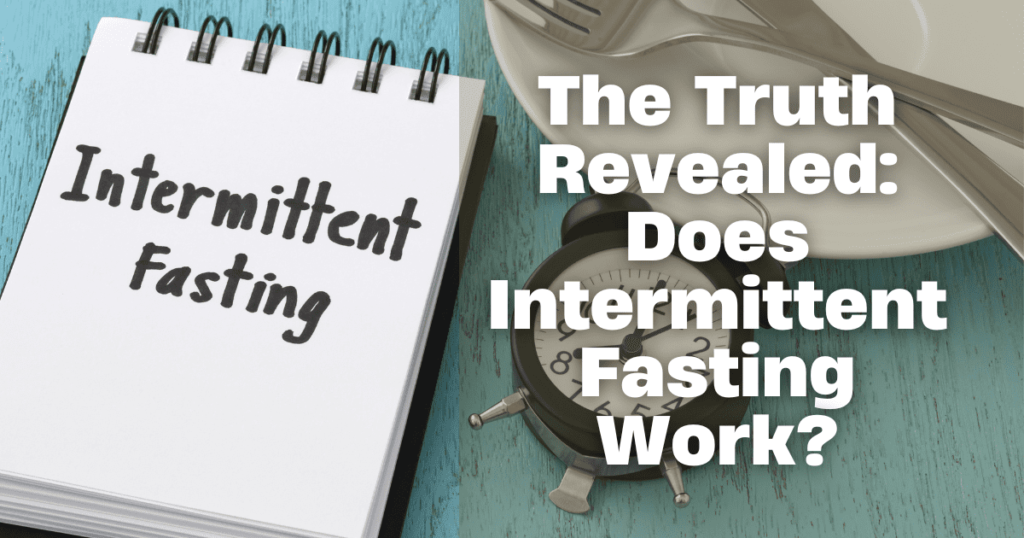Discover the truth about intermittent fasting: Does intermittent fasting work? Explore evidence-based insights, practical tips, and real-life experiences to uncover the effectiveness of intermittent fasting for weight loss and overall health.
Table of Contents
Introduction
Overview of Intermittent Fasting:
Intermittent fasting (IF) is a dietary approach that cycles between periods of eating and fasting. It does not prescribe specific foods to eat but rather focuses on when to eat them. There are various methods of intermittent fasting, including the 16/8 method, alternate-day fasting, and the 5:2 diet.
The concept of intermittent fasting has gained considerable popularity in recent years due to its potential health benefits and its simplicity compared to traditional calorie-restricted diets. Advocates claim that intermittent fasting can aid in weight loss, improve metabolic health, enhance cognitive function, and even increase longevity.
During fasting periods, the body undergoes several physiological changes, such as a decrease in insulin levels and an increase in the production of ketones. These changes can lead to improved fat burning and cellular repair processes.
Purpose of the Blog: The Truth Revealed: Does Intermittent Fasting Work?
The primary purpose of this blog is to investigate and uncover the truth behind the effectiveness of intermittent fasting (IF). With the growing popularity of IF as a dietary approach for weight loss and health improvement, there exists a considerable amount of curiosity and speculation surrounding its efficacy.
This blog aims to provide readers with evidence-based insights and analysis to help them navigate the myriad claims and opinions surrounding intermittent fasting. By delving into scientific research, debunking myths, and examining real-life experiences, the blog seeks to answer the fundamental question: Does intermittent fasting truly deliver on its purported benefits?
Furthermore, the blog intends to offer practical guidance and considerations for individuals who are interested in incorporating intermittent fasting into their lifestyles. By addressing common misconceptions, discussing potential drawbacks, and providing tips for success, the blog aims to empower readers to make informed decisions about whether intermittent fasting is the right approach for them.

Understanding Intermittent Fasting:
A. Definition and Variations of Intermittent Fasting:
A nutritional strategy called intermittent fasting (IF) alternates between periods of eating and fasting. There are several variations of intermittent fasting, including:
– The 16/8 approach is limiting food to an 8-hour window and fasting for 16 hours every day.
– Alternate-day fasting: With this approach, individuals alternate between fasting days, where they consume minimal or no calories, and non-fasting days where they eat normally.
– The 5:2 diet: In this method, individuals eat normally for five days of the week and restrict calorie intake to 500-600 calories on two non-consecutive days.
B. How Intermittent Fasting Affects the Body:
Intermittent fasting triggers several physiological changes in the body, including:
– Reduction in insulin levels: Fasting periods lead to a decrease in insulin levels, which promotes fat burning and facilitates the breakdown of stored glycogen for energy.
– Increased production of ketones: Extended fasting can induce a state of ketosis, where the body relies on ketones as a primary fuel source instead of glucose.
– Activation of cellular repair processes: Fasting stimulates autophagy, a cellular cleaning process that removes damaged components and promotes cellular renewal.
– Regulation of gene expression: Fasting influences the expression of genes related to metabolism, inflammation, and longevity, potentially conferring health benefits.
C. Potential Health Benefits of Intermittent Fasting:
Intermittent fasting has been associated with several potential health benefits, including:
– Weight loss and fat loss: By promoting calorie restriction and increasing fat oxidation, intermittent fasting can aid in weight management and reduce body fat.
– Improved metabolic health: Intermittent fasting may help regulate blood sugar levels, improve insulin sensitivity, and reduce the risk of type 2 diabetes.
– Enhanced cognitive function: Some studies suggest that intermittent fasting may support brain health, improve cognitive function, and reduce the risk of neurodegenerative diseases.
– Longevity and disease prevention: Animal studies have shown that intermittent fasting can extend lifespan and reduce the risk of age-related diseases such as cardiovascular disease and cancer.
Intermittent fasting exerts profound effects on the body’s metabolism and physiology, potentially conferring various health benefits. However, further research is needed to fully understand its long-term implications and determine its suitability for different individuals.

Debunking Myths and Misconceptions:
A. Common Myths Surrounding Intermittent Fasting:
Intermittent fasting is often surrounded by myths and misconceptions. Some common myths include:
– Myth 1: Intermittent fasting slows down metabolism.
– Myth 2: Muscle is lost when fasting occurs sometimes.
– Myth 3: Intermittent fasting is only effective for weight loss.
– Myth 4: Long-term intermittent fasting is not sustainable.
– Myth 5: Intermittent fasting is harmful to women’s health.
B. Addressing Concerns About Metabolism and Muscle Loss:
One of the most prevalent concerns about intermittent fasting is its perceived impact on metabolism and muscle mass. However, research indicates that intermittent fasting does not necessarily slow down metabolism or cause muscle loss when practiced correctly. In fact, intermittent fasting can help preserve lean muscle mass by promoting fat loss while preserving muscle through mechanisms such as increased growth hormone secretion and protein synthesis. Additionally, intermittent fasting may have metabolic benefits such as improved insulin sensitivity and metabolic flexibility, which can support overall metabolic health.
C. Exploring the Science Behind Intermittent Fasting:
The science behind intermittent fasting is multifaceted and continues to evolve as researchers uncover more about its mechanisms and effects on the body. Studies have shown that intermittent fasting influences various metabolic pathways, hormonal responses, and cellular processes, including autophagy and gene expression. These physiological changes contribute to the potential health benefits of intermittent fasting, such as weight loss, improved metabolic health, and enhanced cellular repair. By delving into the scientific evidence, we can gain a deeper understanding of how intermittent fasting works and its implications for health and longevity.

Evidence-Based Research:
A. Reviewing Studies on Intermittent Fasting:
Numerous studies have investigated the effects of intermittent fasting on various aspects of health and wellness. These studies have examined different intermittent fasting protocols, including time-restricted feeding, alternate-day fasting, and periodic fasting. Research findings suggest that intermittent fasting may offer several potential benefits, such as weight loss, improvements in metabolic health markers (e.g., insulin sensitivity, lipid profiles), and reductions in inflammation. Additionally, some studies have suggested that intermittent fasting could have positive effects on brain health, cardiovascular function, and longevity. By reviewing the scientific literature, we can gain insights into the efficacy and mechanisms of intermittent fasting and its potential applications for promoting health and well-being.
Research Here: Intermittent fasting and health outcomes: an umbrella review of systematic reviews and meta-analyses of randomised controlled trials.
B. Discussing the Reliability and Limitations of Research:
While there is growing evidence supporting the health benefits of intermittent fasting, it is essential to acknowledge the limitations and uncertainties in the existing research. Many studies on intermittent fasting have been conducted in animal models or small human cohorts, which may limit the generalizability of the findings. Additionally, variations in study design, fasting protocols, and participant characteristics can influence the outcomes and interpretation of research findings. Furthermore, the long-term effects and sustainability of intermittent fasting require further investigation, as most studies have been of relatively short duration. By critically evaluating the reliability and limitations of research, we can better understand the strengths and weaknesses of the evidence supporting intermittent fasting.
C. Examining Real-Life Experiences and Testimonials:
In addition to scientific research, real-life experiences and testimonials provide valuable insights into the practical aspects of intermittent fasting. Many individuals have reported positive outcomes from incorporating intermittent fasting into their lifestyles, such as weight loss, improved energy levels, and better overall health. However, it is essential to recognize that individual responses to intermittent fasting can vary widely, and what works for one person may not work for another. Furthermore, anecdotal evidence should be interpreted cautiously and balanced with scientific research to provide a comprehensive understanding of intermittent fasting. By examining real-life experiences and testimonials, we can gain practical insights into the challenges, benefits, and potential outcomes of intermittent fasting in everyday life.

Practical Tips and Strategies:
A. Getting Started with Intermittent Fasting:
1. Start Slowly: If you’re new to intermittent fasting, consider easing into it by gradually increasing the fasting window over time.
2. Choose a Method: Select an intermittent fasting method that aligns with your lifestyle and preferences, such as the 16/8 method, alternate-day fasting, or the 5:2 diet.
3. Stay Hydrated: During times of fasting, remain hydrated and reduce hunger by drinking lots of water.
4. Focus on Nutrient-Dense Foods: During eating windows, prioritize whole, nutrient-dense foods to fuel your body and support overall health.
5. Listen to Your Body: Pay attention to how your body responds to intermittent fasting and adjust your approach accordingly. If you experience significant discomfort or negative side effects, consider modifying your fasting protocol or consulting a healthcare professional.
B. Finding the Right Fasting Schedule for You:
1. Experiment with Timing: Try different fasting schedules to find what works best for your body and lifestyle. Some people may prefer fasting in the morning, while others may find it easier to fast in the evening.
2. Consider Your Schedule: Choose a fasting schedule that aligns with your daily routine and obligations. For example, if you have a demanding job or exercise regimen, consider how fasting may fit into your schedule.
3. Be Flexible: Be open to adjusting your fasting schedule as needed based on changes in your routine, social events, or other factors. Flexibility is key to long-term adherence to intermittent fasting.
Also Read: The Perfect Plate: Best Foods for Fat Loss and Muscle Gain!
C. Incorporating Intermittent Fasting into a Balanced Lifestyle:
1. Prioritize Nutrition: While intermittent fasting can be a valuable tool for weight management and health improvement, it’s essential to focus on overall nutrition and dietary quality. A balanced diet full of fruits, vegetables, lean meats, and healthy fats should be consumed.
2. Maintain Regular Physical Activity: Combine intermittent fasting with regular exercise to maximize its benefits for overall health and fitness. Aim for a mix of cardiovascular exercise, strength training, and flexibility exercises to support your goals.
3. Practice Mindfulness: Use intermittent fasting as an opportunity to cultivate mindfulness around eating habits and food choices. Pay attention to hunger cues, savor your meals, and practice mindful eating to enhance your relationship with food.
4. Get Adequate Sleep: Prioritize sleep hygiene and ensure you’re getting enough restorative sleep each night. Adequate sleep is essential for overall health and well-being and can support your efforts with intermittent fasting.
By following these practical tips and strategies, you can effectively incorporate intermittent fasting into your lifestyle in a sustainable and balanced way. Remember to listen to your body, be patient with yourself, and seek support or guidance as needed along the way.

Potential Drawbacks and Considerations:
A. Risks and Side Effects of Intermittent Fasting:
1. Increased Hunger and Irritability: Some people may experience increased hunger, irritability, or difficulty concentrating during fasting periods, especially when starting out.
2. Risk of Nutrient Deficiencies: Prolonged fasting or inadequate food intake during eating windows may increase the risk of nutrient deficiencies, particularly if nutrient-dense foods are not prioritized.
3. Disordered Eating Patterns: Intermittent fasting may exacerbate or trigger disordered eating behaviors in susceptible individuals, such as binge eating or restrictive eating.
4. Potential for Muscle Loss: Inadequate protein intake or excessive calorie restriction during fasting periods may lead to muscle loss over time, particularly if combined with inadequate physical activity.
B. Who Should Avoid Intermittent Fasting?
1. Pregnant or Breastfeeding Women: Intermittent fasting is generally not recommended for pregnant or breastfeeding women, as it may not provide adequate nutrients for fetal development or lactation.
2. Individuals with Eating Disorders: People with a history of eating disorders or disordered eating patterns should approach intermittent fasting with caution, as it may exacerbate unhealthy relationships with food.
3. Those with Certain Medical Conditions: Individuals with certain medical conditions, such as diabetes, hypoglycemia, or a history of metabolic disorders, should consult with a healthcare professional before attempting intermittent fasting.
While intermittent fasting can offer potential benefits for some individuals, it’s essential to consider the potential drawbacks and limitations before incorporating it into your lifestyle. Making educated decisions regarding intermittent fasting can be facilitated by seeking the individualized advice and assistance of a licensed dietitian or other healthcare expert.
Suggested Read: 10 CrossFit Workouts That Will Transform Your Body in 30 Days!
Conclusion:
A. Summary of Key Findings:
Throughout this exploration of intermittent fasting, several key findings have emerged:
– Intermittent fasting involves alternating periods of eating and fasting and comes in various forms, including the 16/8 method, alternate-day fasting, and the 5:2 diet.
– Intermittent fasting affects the body by reducing insulin levels, increasing ketone production, and activating cellular repair processes.
– Potential health benefits of intermittent fasting include weight loss, improved metabolic health, enhanced cognitive function, and potential longevity.
– Common myths about intermittent fasting, such as its supposed negative effects on metabolism and muscle loss, have been debunked through scientific evidence.
– Research on intermittent fasting has limitations, including variations in study design and participant characteristics, but suggests promising outcomes for many individuals.
– Real-life experiences and testimonials provide valuable insights into the practical aspects of intermittent fasting, highlighting both its benefits and challenges.
B. Our Reflections on Intermittent Fasting:
Intermittent fasting has been a subject of great interest and intrigue for us throughout this exploration. As We’ve delved deeper into the research and considered real-life experiences, We’ve come to appreciate both the potential benefits and the complexities of intermittent fasting. Personally, We find intermittent fasting to be a fascinating approach to dietary management, offering a unique perspective on the relationship between food and health. While we recognize that intermittent fasting may not be suitable for everyone and that individual experiences may vary, We are intrigued by its potential to promote metabolic health, support weight management, and optimize overall well-being.







